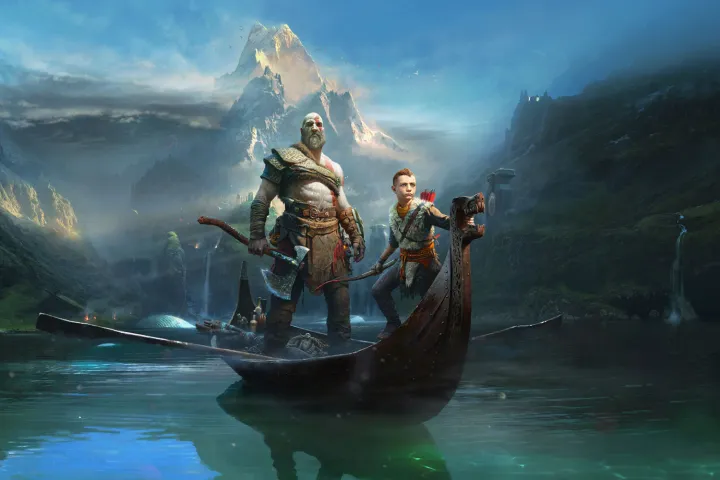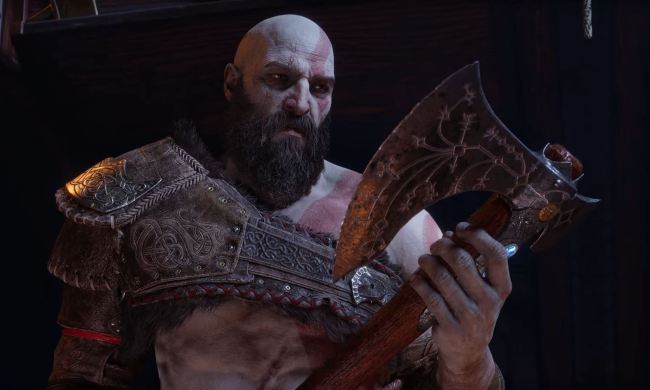
Perhaps the most noticeable change to God of War is Kratos himself. He’s still angry, but he’s sad about it. Which makes sense considering the horrors he endured, and inflicted, during his campaign of revenge against the gods of Mount Olympus.
Older, beardier
The new game features an older, wiser Kratos. He feels the weight of his past in every step, as he trudges through a Norse mythology-inspired wilderness draped in snow and ice. Following at his heels is a new character, Atreus, his son. Their relationship is the heart of the game, it’s the source of much of its tension, drama, and character development — Kratos is a father again, and he’s deeply troubled by what that means for himself and for his son.
“He’s the humanity that Kratos has lost,” director Cory Barlog said. “He’s that mirror that is reminding him that there’s a different way — a way he might have forgotten long ago.”
Kratos is doing the best he can to help his son understand what it is to be a god.
Remember, Kratos has had a rough go of it. Back when he was just a young soldier, the Greek God of War, Ares, tricked him into murdering his entire family. Afterward, he climbed his way up Mount Olympus, leaving the broken bodies of countless gods and monsters in his wake, to take his throne as the new God of War.
Kratos’ ascension to godhood cursed him to immortality, and served as the catalyst for much of the tragedy and horror he endured in the ensuing years. For him, it’s a curse, and that’s key to how he views himself and his son.
“Kratos is doing the best he can to help [Atreus] understand what it is to be a god. There’s this sort of internal struggle with him, because he doesn’t want to tell the kid — to him, it’s the worst thing of his life, being a god,” Barlog continued. “When he found out about that, it was just this horrible, horrible change in his life. So, he’s almost trying to maintain the kid’s innocence a little bit.”
The daddening of Kratos
Fatherhood and the relationship between a parent and child are important elements of the new God of War game, providing an uncharacteristic, refreshing amount of depth to what could otherwise be just another hack-and-slash.
Much of the inspiration behind the decision to take Kratos down a different path lies with Barlog’s own journey into fatherhood.

“You have to find your inroad into a story, regardless of whether you wrote it or not, you have to find your way in,” Barlog said. “As I was sort of looking at [God of War] and realizing how much my life has changed since directing the last one, I was like this is that much of a difference, that it’s important to reflect in what I’m doing.”
Kratos appears, in the short glimpses we’ve seen, to have a bit of a fraught relationship with his son. They’re not always on the same page, they bicker, but at least one important part of their relationship is lifted directly from Barlog’s relationship to his own son.
As we see at the end of the E3 trailer for God of War, Kratos doesn’t understand what the giant world snake is saying to him, so Atreus serves as a translator. It’s a role he fills throughout the game.
“I absolutely, shamelessly, pulled from my own life because my wife is Swedish, and my son is learning to speak Swedish. At five years old, he speaks better Swedish than I do, and he points it out quite often,” Barlog continued. “When my in-laws are in town, everyone is speaking Swedish and I have no idea what they’re saying, so he is kind of the conduit for me to understand what they’re saying.”
Not an escort mission
Narrative depth and father-son relationships are all well and good, but is this still God of War? Absolutely. Combat is quick, brutal, and still as big a part of the game as ever. Barlog was adamant that this game is still the God of War we know and love, and took a moment to address one of the biggest criticisms of the new direction fans have voiced.
“In this trailer, one of the things that I wanted to show is that the DNA of God of War is still here — this is fast, frenetic combat — and Kratos’ son is an integral part of combat,” Barlog said. “It’s not an escort mission by any stretch.”
Beyond the combat shown off in the trailer, we still haven’t seen very much of the game, so it’s hard to get a handle on how the player actually moves through and explores this vast new world. According to the game’s director, it’s a much more open game than previous entries in the God of War series, but it’s not quite open world.
“Discovery is a huge part of this game. It’s not an open world, in the traditional sense, it is more that we have a very large world and you have a goal that takes you throughout the world,” Barlog said.
Exploration is going to be a big part of this game, unlike previous God of War titles which were strictly linear, but it’s not going to be required if you’d prefer a more traditional Point A to Point B type experience.
“That feeling of being rewarded for your curiosity — it’s just huge, that’s why I play video games. This idea of just existing in a world, I want to create something that feels like it embraces that idea — and it doesn’t become a checklist,” Barlog said.
Player choice is central to this new God of War concept, right down to its core mechanics. Rather than shepherding the player through the game with fixed-camera angles and narrow progression options, God of War aims to put the power back in your hands.
“Play the way you want to play. I want to give as much power back over to the player as possible. That’s where games are leaning: give me the tools, let me do what I want to do with it. Let me solve the problem the way I want to solve it — experience the combat the way I want to experience it,” Barlog said.
Parallel progression
Speaking of progression, the addition of Atreus adds an interesting opportunity for players to get really deep into the customization options available to them — how you spec Kratos doesn’t have to be how you spec Atreus. They’ll have their own separate progression options.
We’re leaning a lot more into this idea that Kratos and Atreus having separate progression
“We don’t have a lot that we can talk about at this time, but we’re leaning a lot more into this idea that Kratos and Atreus having separate progression allows you to sort of make choices not only within what you’re going to do with Kratos, but the fact that you might want to do something different with Atreus,” Barlog elaborated.
Allowing the player to branch out with each character feeds into the narrative in a really interesting way. During the trailer, Atreus comments that Kratos’ thinks he’s weak because they’re not exactly alike — that there are other kinds of strength.
“It’s funny because this touches on the concept of misunderstandings, this idea of the kid believing his father thinks that he’s a curse, his father thinks that he’s weak. Because it’s how we interpret it — if our parents are very critical of something, we interpret beyond what their intent is,” Barlog said.
For Atreus, this misunderstanding is a big part of the game. He’s constantly reading beyond the intent of what Kratos says when he’s being critical, and telling Atreus what he did wrong instead of what he did right.
But is it God of War?
The old God of War games were great in their own time, but the world has moved on since then. Games have grown and evolved and become vehicles for more complex and nuanced narratives. This new take on God of War introduces some of those elements but it’s still very much a game about exploring a mythological environment and killing most of the things you find there.
Not everything there is a friendly dwarf who upgrades your gear and cracks wise. Rest assured, the new God of War has plenty of the things to kill, smash, dismember, and freeze with your flying-whirling-ice-axe.
Want to know more? Catch up on Everything We Know about God of War.


